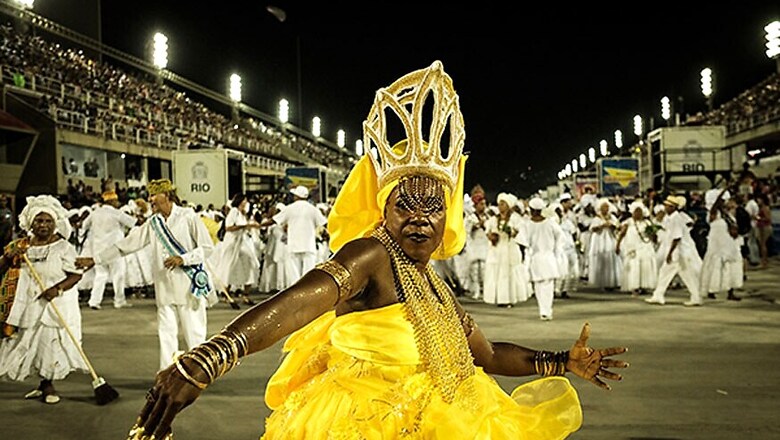
views
The Rio carnival is a celebration of joyful excess but deep recession in Brazil means that samba schools are thinking about their budgets as much as their dance moves.
"Here the key word is austerity," says Luiz Carlos Magalhaes, president of the Portela samba school, which has won the prestigious annual parade contest in the Sambodromo more than any other school.
Like football teams, the samba schools are organized in divisions and their contests are judged on strict criteria where the slightest slip costs points.
That need to pay attention to detail is giving organizers at top-ranked schools a headache as they prepare for battle on February 25-26 at a time of increasingly thin budgets.
"We're living day to day. We raise money with dinner dances at our headquarters and see how much we made before we go out to buy the feathers and sequins," Magalhaes said.
Every school in the first division, known as the Special Group, gets six million reais (about $2 million) from a mixture of city subsidies and proceeds from television coverage. They also raise money through sponsorship and -- although none openly admit this -- funding from illegal gambling rackets.
Portela is in trouble, Magalhaes said, because "our main sponsor dropped us at the last minute. We've really had to bend over backwards to make it work."
At another top-division school, organizers ended up giving free meals instead of pay to the small army employed to sew costumes.
Scrounging
Down in the second division, things are more complicated. They get only a third of the subsidies given to the top flight and sponsors have little interest in chipping in.
"Not only do we have less funds but the materials are more expensive too. That's why we've had to innovate, trying to create an alternative carnival," said Jorge Silveira, artistic director at the Viradouro, which won the whole contest back in 1997.
"By chance I've discovered real treasures in our props department and I've got around the crisis by recycling all sorts of things," he said, seated on a float made in the shape of a huge cake.
Even if Viradouro's hangar is smaller and less modern than the facilities used by Special Group schools, Silveira knows the conditions he is working in are a great deal better than those encountered by lower divisions.
For the third to fifth levels, the contests are not held in the specially built Sambodromo stadium but along Intendente Magalhaes Road in the working class north of Rio. They do not benefit from television rights.
"It's my fifth carnival and it's definitely the worst of the lot. It's a lot harder this year," said Tatiana Santos, president of the Arranco do Engenho school in the fourth division.
"Our subsidy comes in installments and we've not got more than 70 percent so far. The rest will only be paid after carnival -- we'll use it to pay our debts," said Santos, 37, in the dusty hangar where her school puts together its show.
One way of surviving this year was to make the parade a homage to first-division school Salgueiro, which was flattered and loaned the samba minnows costumes and a float.
Fabio Augusto, president of fifth division Tupy de Vraz de Pina, has also had to go scrounging.
"We're living from donations. We've gone from hangar to hangar at the big schools and got all sorts of things," he said.
And things are not as bad as they were.
"When I took over the school two years ago, we didn't even have drum sticks," he said.



















Comments
0 comment